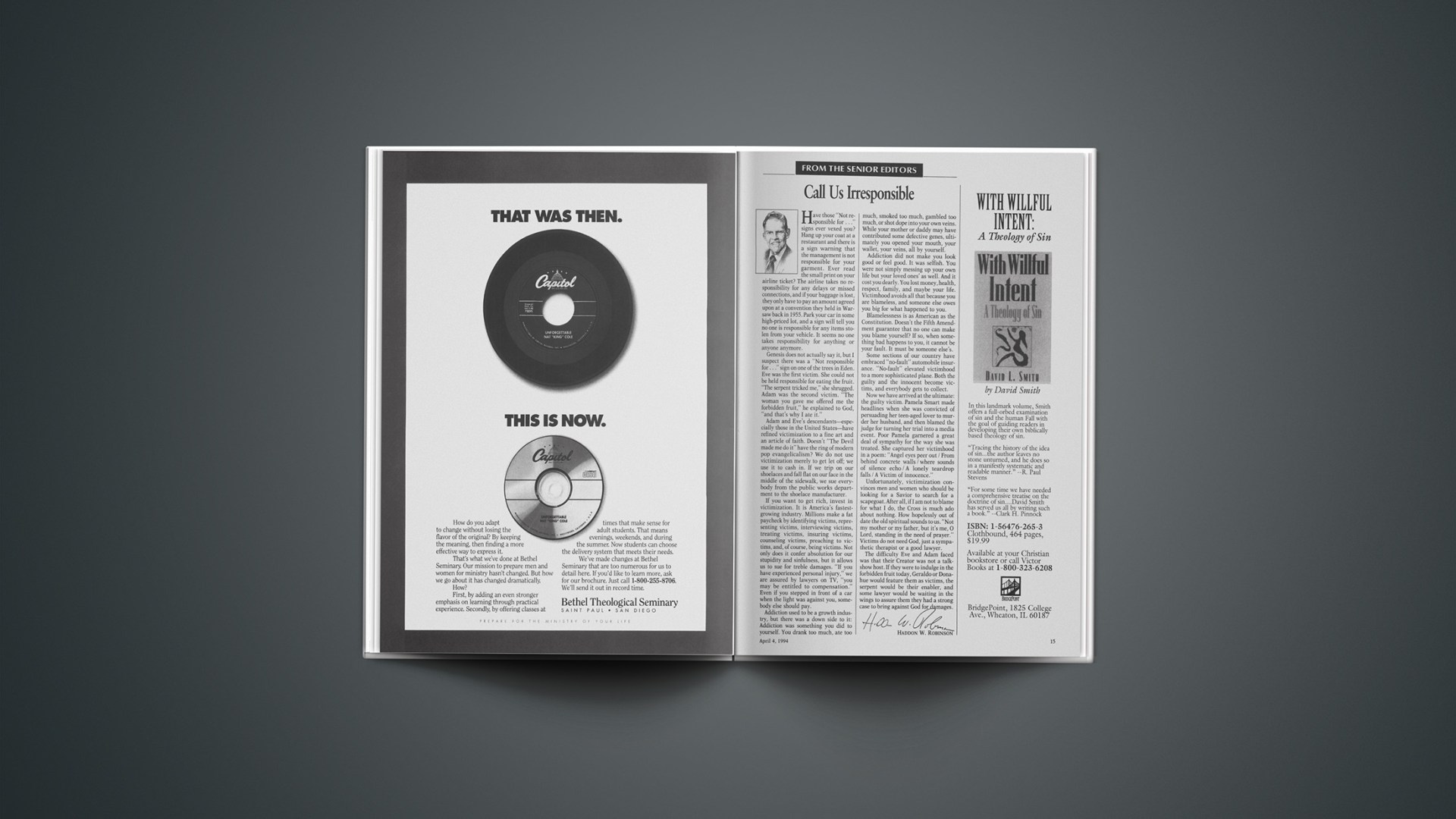Have those “Not responsible for …” signs ever vexed you? Hang up your coat at a restaurant and there is a sign warning that the management is not responsible for your garment. Ever read the small print on your airline ticket? The airline takes no responsibility for any delays or missed connections, and if your baggage is lost, they only have to pay an amount agreed upon at a convention they held in Warsaw back in 1955. Park your car in some high-priced lot, and a sign will tell you no one is responsible for any items stolen from your vehicle. It seems no one takes responsibility for anything or anyone anymore.
Genesis does not actually say it, but I suspect there was a “Not responsible for …” sign on one of the trees in Eden. Eve was the first victim. She could not be held responsible for eating the fruit. “The serpent tricked me,” she shrugged. Adam was the second victim. “The woman you gave me offered me the forbidden fruit,” he explained to God, “and that’s why I ate it.”
Adam and Eve’s descendants—especially those in the United States—have refined victimization to a fine art and an article of faith. Doesn’t “The Devil made me do it” have the ring of modern pop evangelicalism? We do not use victimization merely to get let off; we use it to cash in. If we trip on our shoelaces and fall flat on our face in the middle of the sidewalk, we sue everybody from the public works department to the shoelace manufacturer.
If you want to get rich, invest in victimization. It is America’s fastest-growing industry. Millions make a fat paycheck by identifying victims, representing victims, interviewing victims, treating victims, insuring victims, counseling victims, preaching to victims, and, of course, being victims. Not only does it confer absolution for our stupidity and sinfulness, but it allows us to sue for treble damages. “If you have experienced personal injury,” we are assured by lawyers on TV, “you may be entitled to compensation.” Even if you stepped in front of a car when the light was against you, somebody else should pay.
Addiction used to be a growth industry, but there was a down side to it: Addiction was something you did to yourself. You drank too much, ate too much, smoked too much, gambled too much, or shot dope into your own veins. While your mother or daddy may have contributed some defective genes, ultimately you opened your mouth, your wallet, your veins, all by yourself.
Addiction did not make you look good or feel good. It was selfish. You were not simply messing up your own life but your loved ones’ as well. And it cost you dearly. You lost money, health, respect, family, and maybe your life. Victimhood avoids all that because you are blameless, and someone else owes you big for what happened to you.
Blamelessness is as American as the Constitution. Doesn’t the Fifth Amendment guarantee that no one can make you blame yourself? If so, when something bad happens to you, it cannot be your fault. It must be someone else’s.
Some sections of our country have embraced “no-fault” automobile insurance. “No-fault” elevated victimhood to a more sophisticated plane. Both the guilty and the innocent become victims, and everybody gets to collect.
Now we have arrived at the ultimate: the guilty victim. Pamela Smart made headlines when she was convicted of persuading her teen-aged lover to murder her husband, and then blamed the judge for turning her trial into a media event. Poor Pamela garnered a great deal of sympathy for the way she was treated. She captured her victimhood in a poem: “Angel eyes peer out / From behind concrete walls / where sounds of silence echo / A lonely teardrop falls / A Victim of innocence.”
Unfortunately, victimization convinces men and women who should be looking for a Savior to search for a scapegoat. After all, if I am not to blame for what I do, the Cross is much ado about nothing. How hopelessly out of date the old spiritual sounds to us. “Not my mother or my father, but it’s me, O Lord, standing in the need of prayer.” Victims do not need God, just a sympathetic therapist or a good lawyer.
The difficulty Eve and Adam faced was that their Creator was not a talk-show host. If they were to indulge in the forbidden fruit today, Geraldo or Donahue would feature them as victims, the serpent would be their enabler, and some lawyer would be waiting in the wings to assure them they had a strong case to bring against God for damages.










